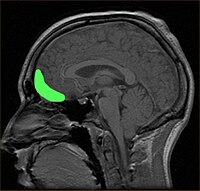
Photo from wikipedia
Borderline personality traits, which can be defined as complex and hard to manage clusters of maladaptive symptoms related to relationships, self, affection, and impulsiveness, are known to have high comorbidity… Click to show full abstract
Borderline personality traits, which can be defined as complex and hard to manage clusters of maladaptive symptoms related to relationships, self, affection, and impulsiveness, are known to have high comorbidity with psychological symptoms. Gray’s Reinforcement Sensitivity Theory (RST) is one of the important theories that is used in explaining psychopathology. However, research on this field is mainly based on the data collected from WEIRD (western, educated, industrialized, rich, and democratic) populations. Depending upon sample characteristics differences might be observed. Thus, based on existing literature, the research questions of the present study are (1) whether borderline personality feature severity significantly positively correlates with both psychological symptoms in Brief Symptom Inventory (BSI), and BIS and BAS; (2) will BIS and BAS mediate the relationship between borderline personality feature severity and psychological symptoms in the BSI in a sample of Turkish youth in accordance with the existing Western based literature. It is found that while the relationships between borderline personality feature severity and anxiety, interpersonal sensitivity, obsessive compulsive symptoms, and depression are mediated by BIS-anxiety, the relationship between borderline personality feature severity and depression, phobic anxiety, and hostility are mediated by BAS. Our findings are consistent with literature findings of Western studies, underlying the role of BIS and BAS which is shown to be culture-free in this study.
Journal Title: Current Psychology
Year Published: 2021
Link to full text (if available)
Share on Social Media: Sign Up to like & get
recommendations!